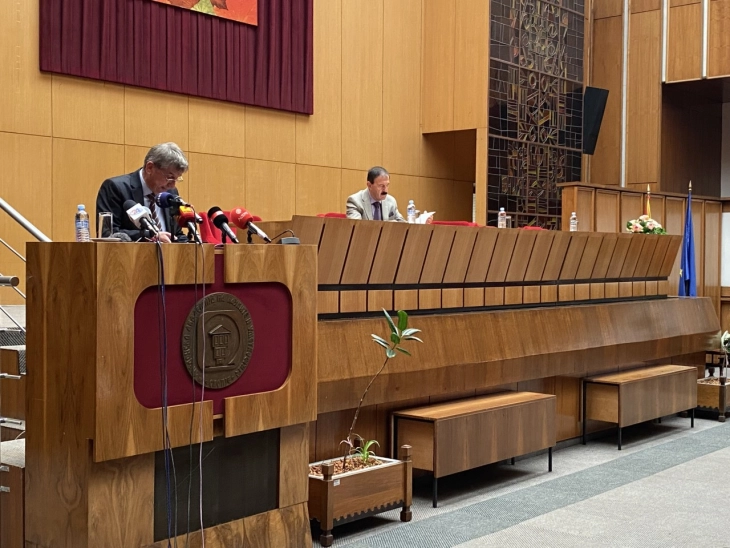Kocarev: Very low probability of full-fledged EU membership in next 30 years

Skopje, 7 October 2022 (MIA) – We should face the reality that the probability of the country becoming a full-fledged EU member in the next 30 years is very small, said the President of the Macedonian Academy of Sciences and Arts (MANU), Ljupcho Kocarev, at his address Friday on the occasion of the Day of the Academy.
As reasons for this, Kocarev pointed to the slow pace of the EU integration processes of the Balkan countries, as well as to the opposition of some EU members to admitting new members which would hold veto power.
Kocarev said he believes that the effort to reconcile the differing perceptions of Balkan history is a key factor in the current EU accession talks, but, he emphasized, the process constantly encounters new obstacles, when “sincere repentance as an act of humanity is lacking.”
“With the signing and implementation of the agreements with Greece and Bulgaria a cultural genocide is being carried out against the Macedonians in their country of Macedonia, as well as the Macedonians in the neighboring countries, but also wherever they live and exist as a people,” said Kocarev.
Kocarev said that before any agreements were signed, and then after the signing of any agreements as well, the country had to and should have sought some kind of repentance from all of the contracting parties, who, he said, “have for many years, and even decades, committed genocide upon the Macedonians and denied the existence of the Macedonian people and the Macedonian language.”
According to the head of MANU, the Academy should expect public repentance from all those institutions who for years have promoted radical and injust positions that are threatening and denying the Macedonian identity and the Macedonian language, which are basic conditions for fruitful and constructive inter-academic cooperation.
He pointed out that in a time of high inflation, high debts of the private and public sector, disrupted supply chains and an energy crisis, a National Development Strategy is needed, as well as an agreement on economic reforms, policies and measures, to be implemented in, at least, the next 20 years.
This, he said, should be done in cooperation with MANU, the universities, the economic chambers, trade unions, nongovernmental sector and the media, while at the same time, he emphasized “overcoming the clientelist and party agenda of action in the social spheres.”
Kocarev informed that in 2023, MANU, in cooperation with all other social factors, will begin to draft a National Development Strategy for Macedonia in the next 20 years.
Regarding the situation in the Academy, Kocarev said that MANU right now is a reflection of that which is happening in education, science and art, which is why it is an entirely marginalized institution, struggling to survive, with a lack of employees in key places, necessary for the smooth institutional functioning of the administrative activity and with employees with the lowest salaries compared to all other employees of the country’s public institutions.
However, he said, despite the lack of care for the “temple of science and art,” based on the number of scientific research and art projects, with financial support from international institutions, divided by the total number of academicians and employees of MANU, the Academy is among the leading scientific and educational institutions in the world.
“Simply said, MANU, even though it is small and entirely marginalized by the governing elites in the country, is a world-renowned institution both in terms of quality and quantity,” added Kocarev.
On the occasion of the Day of the Academy, after academician Kocarev’s address, academicians Pavol Zhigo and Karolin Snajveli were awarded the international “Blazhe Koneski” recognition. ad/nn/







